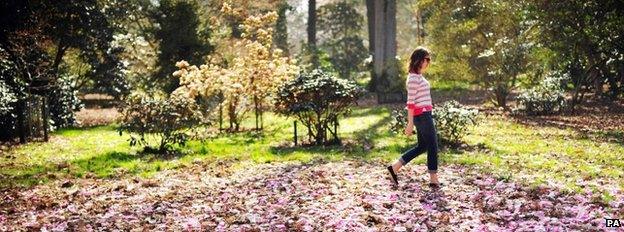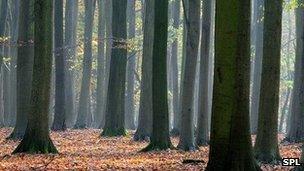Climate change tree test begins
- Published

Westonbirt Arboretum is one of the sites in England for the test
European forestry scientists have begun a multi-national field trial to identify trees that will thrive as predicted climate change develops.
Thousands of trees are being planted in test plots from Portugal in the south to Scotland in the north.
The trees will be measured and monitored as they grow in the diverse environments.
The results are likely to have a marked impact on which species of trees are planted in the coming decades.
In Wales, a cleared area of the Crychan Forest about the size of five football pitches is being planted in a carefully mapped grid system.
The saplings going into the ground have been imported from the Mediterranean, Eastern Europe, California and beyond.
Scientists here - and across Europe - know that climate change is likely to have a big impact on how well trees survive and thrive in the future, and how resistant they may be to a new wave of disease which the predicted warmer conditions may bring.
As the trees are being planted, they are measured and assessed. This is the base level data against which their future growth and health will be compared. Measurements will continue for decades to come.
In the Crychan Forest plot alone, some 6,000 trees are being planted. It's just one of dozens of similar sites ranging from the Azores in the south, up the 1600 miles of the Atlantic coast through Britain and up to the Isle of Mull.
Peebles in the Scottish Borders is also involved in the trials.
In England, there are research plots in the Crowthorn Forest and the Westonbirt Arboretum.
Chris Jones of the Forestry Commission in Wales is overseeing this site. He said: "This is one of the biggest trials we've done in forest research. The kind of information we're getting out of it is going to inform the policy makers and the foresters of the future about the species that they will be able to use."
He knows that this is only the beginning of a lengthy project, but says climate change is already here, and that foresters must calculate how to respond.

The tests will measure UK native species' characteristics against trees from around the world
"We've already got examples of species getting out of their climate niche. And we're already getting problems with drought. We're getting drought crack in the timber and so what we are looking for is other species to replace those and maintain a productive forest for the country."
The data collected could establish for example whether oak trees from southern Europe may become a viable alternative should our native oaks fail. It should also dictate the best commercial trees for the changing conditions.
But forestry is a slow business. And it could be many years before the data can be put to practical use.
Dr Keith Kirby of Natural England said: "The main problem is the timescale. With any trial, we can only get the answers as the trees grow, and so we can get lots of information in the short term. But to be useful we have to wait until the trees mature - that is 50 years', 100 years' time.''
This 12-nation, 37-location project is certainly aimed at helping future timber industry. But, says the Forestry Commission's Chris Jones, it is about the natural environment too.
"This is not just about timber production. It is also about making sure that the woodlands that we have got are in a suitable condition to go on into the future."
- Published26 March 2012
- Published21 March 2012
- Published10 January 2012
- Published6 January 2012
- Published18 February 2011
- Published9 November 2011